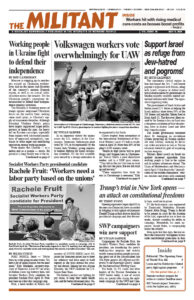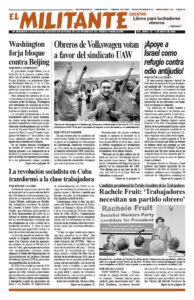Opening arguments began April 22 in the one case Democrats have succeeded in bringing to trial against archnemesis Donald Trump in their drive to derail his presidential campaign and, they fervently hope, send him to prison.
It’s the hush-money case engineered by Democratic Manhattan Attorney General Alvin Bragg. Trump is forced to be present in court for the duration of the trial, expected to last at least six weeks, sharply curtailing his ability to campaign. Meanwhile, his main opponent, Joseph Biden, is campaigning across the country.
Even in its first few days, the trial reflects the Democrats’ willingness to toss aside constitutional protections in their partisan hysteria against the former president.
Trump is charged with maneuvering to conceal payments to Michael Cohen, his lawyer at the time, who is alleged to have paid Stephanie Clifford, also known as Stormy Daniels, in exchange for her silence about a relationship she claims she had with Trump. But signing a nondisclosure agreement is not a crime and even if Trump is found guilty of falsifying business records, it’s only a misdemeanor. To get around this, Bragg cooks up a felony — with potential jail time — by claiming the payments to Cohen were part of a scheme to “unlawfully” corrupt the 2016 election.
Prosecutor Matthew Colangelo, a former Biden administration official now on Bragg’s payroll, tried to puff up this “crime” during opening statements. He accused Trump of a “long-running conspiracy” that was “election fraud, pure and simple.”
This is the first-ever criminal trial of a presidential candidate of one of the U.S. rulers’ two main parties. It’s a political prosecution put together after Bragg campaigned for DA as the candidate most likely to bring Trump down. And it’s an unconcealed assault on First Amendment rights to free speech. Safeguarding these freedoms is vital to workers and our unions.
Trump’s lawyers tried to get the trial moved out of New York City, with its overwhelming Democratic Party majority. The need for this was made clear by the difficulty the judge had in selecting a jury. He excused some 200 people for being unable to reach a fair verdict before 12 jurors and six alternates could be seated. Even then, some of those selected made it clear they were prejudiced against Trump.
One woman said she thought Trump “seems very selfish and self-serving,” adding, “I don’t like his persona.” Merchan seated her anyway. The Constitution’s Sixth Amendment gives all those facing charges the right to a “public trial, by an impartial jury.”
Judge gags a presidential candidate
Merchan has imposed a far-reaching gag order on Trump that bans him from commenting about potential witnesses that Bragg may call during the trial, including those who are campaigning against him.
Prosecutors filed a motion urging Merchan to fine Trump for allegedly violating the gag order by referring to Cohen and Clifford as “two sleaze bags,” and for retweeting a statement by Michael Avenatti, Clifford’s former lawyer. He says, “It is outrageous that Cohen and Daniels can do countless TV interviews, post on social [media] and make $$ on bogus documentaries — all by talking s–t about Trump — but he’s gagged and threatened with jail” if he responds.
Bragg insists Trump’s description of Cohen as a “disgraced attorney and felon” breaches the gag. But Cohen says he lied in court and to the media and pleaded guilty to lying to Congress, for which he was disbarred from practicing law in New York.
Prosecutors demand Merchan threaten Trump with 30 days in jail for any further remarks about Cohen, Clifford or other witnesses. When defense lawyer Todd Blanche pointed out that Trump was merely replying “to a barrage of political attacks” from Cohen, Merchan dismissed it, warning Blanche he was “losing all credibility with the court.”
A higher court will hear Trump’s appeal of the gag order after April 29. Merchan’s assault on free speech protections undermines Trump’s ability to defend himself and advance his presidential campaign.
Bragg’s case has gotten help from the judge. When the statute of limitations ran out on the charge of falsifying business records, Merchan said it was OK, he could file the charges anyway, justifying the extension because of the COVID pandemic.
Bragg says the falsification of business records was done with the intent to carry out another crime, which makes it a felony, but he has yet to identify what that charge is. Instead, he drops innuendos, like the far-fetched argument that paying off a mistress should have been filed as a campaign expense!
None of his allegations amount to anything close to a crime. But Bragg and Merchan are determined to push ahead. Democrats fear that the other cases they’ve cooked up against Trump won’t go to trial in time to affect the election, if ever.
Even some liberals admit the case is an embarrassment. Jed Handelsman Shugerman, a law professor at Boston University, wrote an op-ed in the New York Times April 23 titled, “The Bragg Case Against Trump Is a Historic Mistake.” He sums the prosecution up as “an embarrassment of prosecutorial ethics and apparent selective prosecution.”
As the Democrat-led assault on rights continues, more workers recognize the courts will not only be used against a conservative capitalist politician like Trump, but also by the bosses and their government to frame us up when we fight their attacks. And especially when we form our own party, a labor party, and enter the political arena to advance our own class interests against the employing class.

